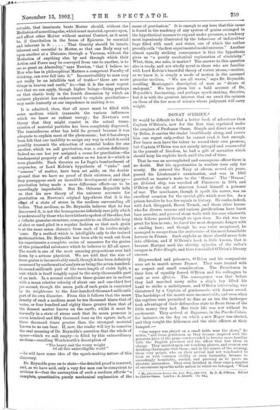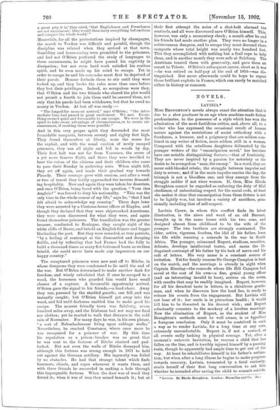DONAT O'BRIEN.*
IT would be difficult to find a better book of adventure than Captain O'Brien's, now for the first time reprinted under
the auspices of Professor Oman. Simple and direct as a story by Defoe, it carries the reader breathlessly along, and causes him one regret only,—that he cannot read it fast enough. Few brave men have the talent to record their own prowess ; but Captain O'Brien was not merely intrepid and resourceful in the pursuit of freedom, be had a gift of narrative which should keep his exploits fresh until the end of time.
That he was an accomplished and courageous officer there is no doubt. But his opportunities in warfare were only too scanty. He entered the Navy at eleven, served six years, passed his Lieutenant's examination, and was in 1803 gazetted as master's mate to the ' Hussar.' The Hussar,' an ill-fated ship, was wrecked off Finisterre in 1804, and O'Brien at the age of nineteen found himself a prisoner of war. The mischance, though it spoilt his career, was an excellent occasion for the special gifts which were his. As a prison-breaker he has few equals in history. He ranks, indeed, with Jack Sheppard, Baron Trenck, and those other heroes who for diverse reasons and various justifications have burst bars asunder, and pierced stone walls with the ease wherewith their fellows passed through an open door. No risk was too great for him to run ; ho faced the most desperate danger with
a smiling face ; and though ho was twice recaptured, he managed to escape from the souterrains of the most formidable
fortress in France. Such exploits as these should never fade into oblivion, and if O'Brien's book is little known, that is
because Marryat used the stirring episodes of the sailor's escapes in Peter Simple, and thus forestalled O'Brien's literary
success.
Shipwrecked and prisoners, O'Brien and his companions were set to march across France. They were treated with no respect and small consideration. The Frenchmen in
their love of equality forced O'Brien and his colleagues to rank as sous officers. The consequence was that before they had marched many miles a ship's boy lifted his
hand to strike a midshipman, and O'Brien intervening, was threatened by a Captain of gendarmerie with drawn sword. The hardships of the march were inconceivable, and even when the captives were permitted to dine at an inn the innkeeper took advantage of their defenceless state to fleece them of the little money they bad. But their life was not without its excitement. They arrived at Bapa.ume, in the Pas-de-Calais, for instance, on the day on which a new Mayor was elected, and they caught the Aldermen and the civic officers at their banquet :—
"Our supper was placed on a small table near the stove," ho writes, "and those gentlemen as they became, inspired with the generous juice of the grape condescended to become more familiar with the English prisoners and the officer that had them in charge. They insisted upon our touching glasses, and even on our drinking champagne with them ; and in the course of the evening, these very people, who on their arrival had not vouchsafed to treat us with common civility or even humanity, became so exceedingly hospitable, cordial, and pressing as to prove an absolute annoyance. They even lavished in their cups a number of encomiums upon the noble nation to which we belonged. ' What • My Adventures during the Late War, 1804-1814. By D. H. O'Brien. Edited by Charles Oman. London : E. Arnold. 17e. 64.1 a great pity it is,' they cried, 'that Englishmen and Frenchmen are not unanimous ! they would then carry everything before them and conquer the whole world.'"
Meanwhile, for all the protestations inspired by champagne, the march to Verdun was difficult and painful, though the discipline was relaxed when they arrived at that town. Gambling and horse-racing were permitted to the prisoners, and had not O'Brien preferred the study of languages to these amusements, he might have passed his captivity in dissipation ; but not even hard work satisfied his restless spirit, and he soon made up his mind to escape. Yet in order to escape he and his comrades must first be deprived of their parole. Honour forbade them to stir until they were locked up, and they broke the rules more than once before they lost their privileges. Indeed, so scrupulous were they, that O'Brien and the two friends who shared the plot would not permit a fourth to join them until he assured them, not only that his parole had been withdrawn, but that he owed no money in Verdun. At last all was ready :-
" The longed-for moment arrived," says O'Brien ; " the inter- mediate time had passed in great excitement. We met. Every- thing seemed quiet and favourable to our escape. We were in the spirit to take every advantage of circumstances, or to create cir- cumstances, if creating them were possible."
And in this very proper spirit they descended the most formidable ramparts, between seventy and eighty feet high. They found themselves at liberty, none the worse for the exploit, and with the usual caution of newly escaped prisoners, they ran all night and bid in woods by day. Their first halt was not far from Varennes, the scene of a yet more famous flight, and there they were terrified to hear the voices of the citizens and their children who came to pass their Sunday in gathering nuts. When night fell, they set off again, and made their gradual way towards Picardy. Their courage grew with custom, and after a week or two of travel they boldly approached the taverns demand- ing hospitality. Now and again they were taken for deserters, and once O'Brien, being faced with the question, " Vous etes Anglais P " was forced to deny his nationality. " This was the only time in the whole course of my life," says he, "that I had telt afraid to acknowledge my country." Three days later they were arrested by a Customs-house officer at Etaples, and though they declared that they were shipwrecked Americans, they were soon discovered for what they were, and again found themselves prisoners. The humiliation was the greater because, conducted to Boulogne, they caught sight of the white cliffs of Dover, and beheld an English frigate and lugger blockading the port. But they were consoled, as true patriots, "by a feeling of contempt at the dismantled and decaying flotilla, and by reflecting that had France had the folly to build a thousand times as many flat-bottomed boats as we then beheld, she could never have made any impression on our happy country."
The recaptured prisoners were now sent off to Bitche, in whose dungeons they were condemned to lie until the end of the war. But O'Brien determined to make another dash for freedom, and wisely calculated that if once he escaped to a wood, the horsemen who guarded him would have small chance of a capture. A favourable opportunity arrived. O'Brien gave the signal to his friends,—a loud cheer. Away they ran, pursued by the startled guards; one fell, and was instantly caught; but O'Brien himself got away into the wood, and hid until darkness enabled him to make good his escape. The nearest friendly town was Salzburg, seven hundred miles away, and the Irishman had not map nor food nor clothes ; yet he started to walk that distance in the cold rain of November. For many days he was, in his own phrase,
" a sort of Nebuchadnezzar living upon cabbage stalks." Nevertheless, he reached Constance, where once more he was recognised for a prisoner of war. By this time his reputation as a prison - breaker was so great that he was sent to the fortress of Bitche chained and pad- locked. But not even the walls of Bitche dismayed him,
although this fortress was strong enough in 1871 to hold out against the German artillery. His ingenuity was foiled by no obstacles. He had that strange talent which finds hammers, chisels, and ropes whenever it wants them, and with three friends he succeeded in making a hole through this impregnable fortress. When the door was of wood they forced it ; when it was of iron they mined beneath it ; but at
their first attempt the noise of a shot-bolt alarmed the sentinels, and all were discovered save O'Brien himself. This, however, was only a momentary check; a month after he and his friends had made another plan. They were no longer in a subterranean dungeon, and to escape they must descend three ramparts whose total height was nearly two hundred feet. This they accomplished with nothing but a frail rope to help them, and in another month they were safe at Salzburg. The Austrians treated them with generosity, and gave them an escort to Trieste. O'Brien's subsequent career, short as it was —he was retired on half-pay at the end of 1814—was dis- tinguished. But never afterwards could be hope to repeat those brilliant exploits in France, which can rarely be matched either in history or romance.























































 Previous page
Previous page